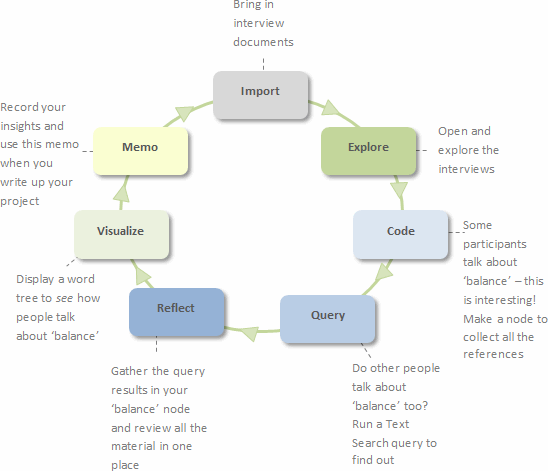Using NVivo for qualitative research
This topic discusses the process of qualitative research and describes different approaches you can take using NVivo.
In this topic
- What is qualitative research?
- Qualitative research as an iterative process
- Have I got the right NVivo edition to support my analytical needs?
What is qualitative research?
Qualitative researchers are interested in evaluating, interpreting and explaining social phenomena. They analyze unstructured or semi-structured data like interviews, surveys, field notes, web pages, audio visual material and journal articles—and they work in a range of sectors; from social science and education to healthcare and business.
Researchers usually adopt a qualitative methodology to suit their research question. For example, a social scientist wanting to develop new concepts or theories may take a ‘grounded theory’ approach. A researcher looking for ways to improve health policy or program design might use ‘evaluation methods’. NVivo doesn’t favor a particular methodology—it’s designed to facilitate common qualitative techniques no matter what method you use.
Remember that NVivo can help you to manage, explore and find patterns in your data but it cannot replace your analytical expertise.
Qualitative research as an iterative process
Handling qualitative data is not usually a step-by-step process (first import, then code, then query, then interpret and then write-up). Instead, it tends to be an iterative process where you explore, code, reflect, memo, code some more, query and so on. For example, this picture shows a path you might take to investigate an interesting theme:

For some ideas about how to approach your project, refer to Choosing the best approach for your project.
Have I got the right NVivo edition to support my analytical needs?
There are three editions of NVivo 11 software: NVivo Starter, NVivo Pro and NVivo Plus. Each edition features a different level of functionality to support a range of projects and research needs.
The right NVivo edition for your project depends on:
-
The format of the data you want to analyze (documents, audio visual material, etc)
-
The type and depth of analysis you want to do
-
Your research methodology and goal
In general, NVivo Starter supports less complex data and less complex analysis. You should evaluate the features in each edition and understand your research needs to choose the edition of NVivo that is right for you.
Refer to Understand product editions (What's the difference between the editions?) for more information.


